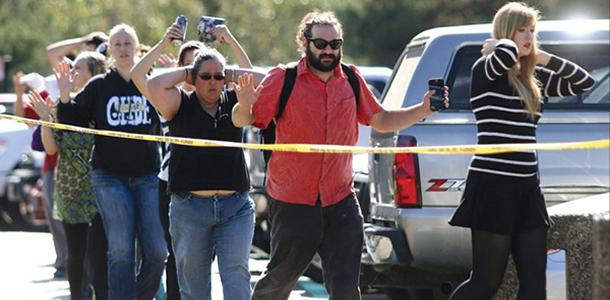Another school shooting, debate on guns continues
A country that has long supported the constitutional right of citizens to keep and bear arms has a serious illness that does not seem to be going away anytime soon.
On Thursday, Oct. 1, just a few hours after 10 students at Umpqua Community College in Oregon were gunned down by 26-year-old Christopher Harper Mercer, the small town of Inglis, Florida, became the home of the 1,000th mass shooting in the U.S. since the Sandy Hook shooting almost three years ago.
Perhaps what is most shocking is the lack of media coverage given to the majority of these life-altering events.
“Somehow this has become routine,” said President Barack Obama following the Oregon community-college shooting. “The reporting is routine. My response here at this podium ends up being routine. The conversation in the aftermath of it. We’ve become numb to this.”
The recent Oregon shooting was the 994th mass shooting in the 1004 days since Sandy Hook, according to The Guardian, while The Washington Times reported it as the 142nd school shooting since Sandy Hook.
“We have a responsibility to make something happen,” Tom Bittman of Sandy Hook Promise, told the New York Daily News. “Our country has been stuck in a rut. We talk past each other … we don’t listen.”
Many more Americans have since advocated for more detailed background checks in order for someone to legally purchase a firearm, while others have supported mental health facilities and mental background checks.
According to the NRA’s official statement regarding the Roanoke, Virginia, shooting in August that claimed the lives of two television journalists, “The alleged shooter passed not one, but two background checks. Clearly, expanding a broken system is not the solution”.
“(The) NRA has been calling for meaningful mental health reform so those suffering from mental illness who are found to be a danger to themselves or others will not have legal access to firearms.”
But some people feel that labeling all mental health patients as “terrorists” or “psychopaths” is discriminatory and unnecessary. They argue that legislative action making it harder to obtain firearms would be much more effective.
“If strong gun control legislation is passed, the severely mentally ill will be unable to obtain weapons with which to commit violence,” said “The Progressive Cynic” Joshua Sager in his January 2012 blog. “By attacking gun violence from the weapons side, massacres can be prevented and the rights of the mentally ill can be maintained.”
Based on the frequency of mass shootings from Jan. 1, 2009, and Dec. 31, 2013, the U.S. sits at the top of the list for the highest total frequency of gun violence, but drops to number six on the list when population differences between countries are accounted for.
Even though the vast majority of Americans feel that something must be done to decrease the occurrences of these shootings, a solution is indeed very far away.
“We live in a ‘free country’ more or less, and there’s a lot of money to be made and a lot of politics, so any kind of a quick fix I think is probably down the drain,” said Assistant Professor of Political Science Robert Duncan.






